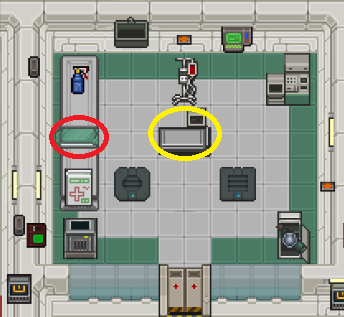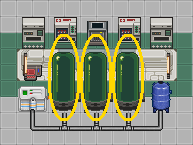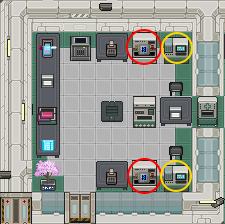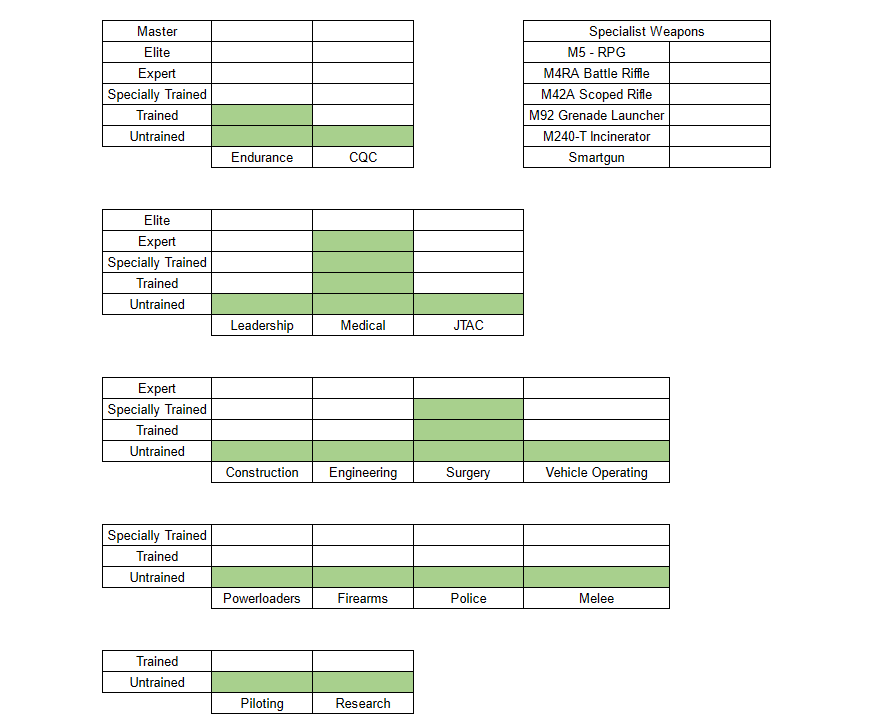More actions
 |
Difficulty: Medium Supervisors: Chief Medical Officer Rank: Not defined Duties: Heal severely injured marines, do surgery. Guides: Guide to Medicine, Surgery, Guide to Chemistry Unlock Requirements: Not available. Detailed Description: Not defined |__________| |
"Doctor, I can't feel my legs!"
"I know, we amputated them!"
― A Patient and a Doctor
A Squad Medic can bandage a wounded marine, but sometimes the situation is so bad that the Marine should be taken from combat back to the Almayer. That's where you, the Almayer Doctor comes, safe in your medbay on the Almayer, you'll be doing all the things normal field medics can't do.
Role
Your job as a Almayer Doctor is to heal what the Combat Medics can't. You will be responsible for:
- Treating major wounds and infections
- Operating on patients in need of major surgeries
- Concocting medicine as required
- Handling triage
You answer to the Chief Medical Officer, and should follow their instructions and advice at all times, however if the Commander gives you an order it takes priority over the Chief Medical Officers. In the event that you are ordered to create a field hospital remember that the CMO and acting commander have to agree to send you planetside. You also work with the Researcher, they don't really do much, but don't bother them in case they're on the verge of a breakthrough!
Tools of the Trade
The Almayer doctor is given a number of trusty tools to assist him or her in their duty, which is, being a doctor! These tools include:
- Two cryogenic cells
- A chemistry laboratory
- An autodoc medical system
- Four operating theaters
- One sleeper
- Six cryogenic freezers (For placing players who have left the game into.)
- Four body scanners
- A ton of medical kits, defibrillators and a bunch of other supplies in the vendors
- Multiple IVs and a supply of blood bags
I'm a doctor! Now what?
At the beginning of each round, you will have 20-30 minutes to prepare the Medbay before injured marines start showing up. During this time, you won't have many injuries to tend with, so it is best to try to prepare for the flood of casualties in Medbay by doing 'common tasks' detailed below.
Common tasks that help improve the effectiveness of your medical environment:
| Set up the IV drips. | IV drips are used to provide patients with blood. To use them, take a blood pack (or a beaker, if you want to inject chemicals) and use it on the IV drip to load it. After loading the IV drip, pull it to be adjacent to your patient and click-and-drag the IV drip to your patient's body. You should get a message that the IV drip was attached. MAKE SURE THAT THE BLOOD IS COMPATIBLE WITH YOUR PATIENT. (See attached chart) When in a hurry, use O- blood. (all blood types can take O- blood) | Always unattach the IV drip from the patient if he is about to be moved away. Patients will take minor brute damage if you pull them away while they are still attached. |
- Please refer to the chemistry guide for details of what is available to create, please see Server Rules & Marine Law for an idea of what is illegal to distribute. Also understand the Standard Operating Procedure as it applies to Doctor.
Surgery
 The Upper Left Operating Room, prepared for surgery. Red circle around the surgical tool storage, Yellow circle around the Operating Table The Upper Left Operating Room, prepared for surgery. Red circle around the surgical tool storage, Yellow circle around the Operating Table |
As the round progresses, your main role will be to administer aid to the individuals that visit the Medbay. Since Squad Medics can patch up and resolve minor injuries, marines will typically only visit the Medbay if they have a severe internal injury that requires surgery. As such, it is critical to triage cases properly. Stasis Bags are a reasonably safe way (not very fun, though for the patient) to limit avoidable deaths in Medbay. Because surgery is a time-consuming process with many separate steps, it is important to be educated on how to conduct surgery. |
General Guidance
Nobody likes to wait in the Medbay while they are injured and unconscious. As a doctor, you need to organize your activities and manage your workflow efficiently in order to process patients quickly and reduce the time that everyone has to wait. This can become especially important if you are the only doctor actively conducting surgery. It's equally important to have a thick skin, because most players will be irritated that they were injured to start with.
Remember that you can restock empty injectors, bottles and medical supplies in the medical vendors by clickdraging them back onto it. This makes them usable again. Pill bottles are not restockable in this manner.
Your actions will have a large impact upon whether or not the marines will be victorious, because your ability to do surgery influences the number of active marines currently engaged in combating the alien menace. Do your job well, but remember - this is not a chore. Perform your duties at your own pace, and most importantly remember to breathe and have fun.
Efficiency Tips
- Before conducting surgery, always check the body scan of the patient and have it readily available in your mind. If you are unable to remember the scan, don't fred, you can just examine your patient and read up on the saved scan data again for reassurance.
- If the patient has low blood levels and also requires surgery, give them the IV drip while they are on the surgery table.
- Print mechanical limbs early on in the surgery procedure so they are ready immediately when you need them.
- Remember that - thanks to The Companys improved technology - you just need to put the patient on a surgery table, then drag his sprite onto the surgery table to hook him up with anesthetics for your operation to commence. Be sure though that there's an anesthetic tank loaded up beforehand!
- Washing your hands is crucial to avoid infections during surgery. It is recommended to always clean your bloodied hands/gloves either through washing or by spraying Space Cleaner on yourself throughout the surgery to avoid infections and necrosis.
- The Incision Managment Tool is a godsend when it comes to state of the art surgery procedures. Use this instead of the usual way of a scalpel and retractor. The IMT does all three steps (incision, retracting and bleeder clamping) in one click!
- For a single patient, conduct all required surgeries at once. This reduces the number of times you need to pick up surgery tools. For example: If a patient has internal bleeding, heart/lung damage, a broken ribcage and shrapnel, cut open his chest, treat the IB with Fix-O-Vein, use a hemostat to remove the shrapnel, then use a trauma kit for the organ damage, retract the skin, use bone gel and the bone setter for the bones and close him up. Done!
- Don't fight with the other doctors over the operating rooms. Simply wait for it to get vacant instead of arguing with the people around you.
- If a patient does not succumb to anesthesia when you hook him onto the surgery table, check for a collapsed lung! Patients with this type of injury usually suffer from oxygen damage which prevents them from falling asleep. In that case, administer a dosage of Dexalin+ to bridge the time till you fix the lungs.
Your Skillset
To find out about how the skill system works head over to the skills system page.





